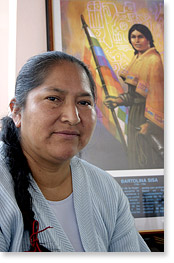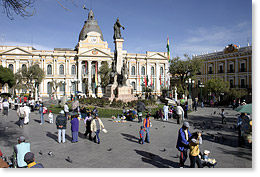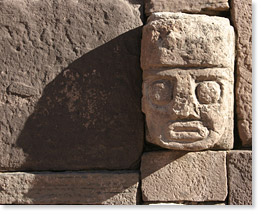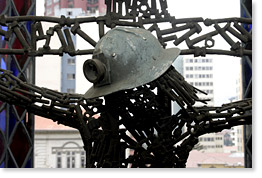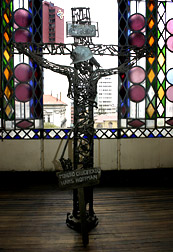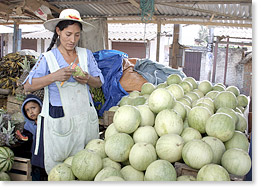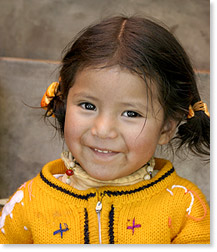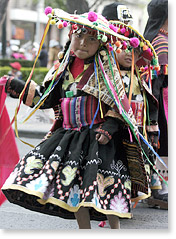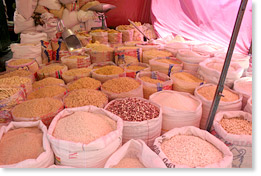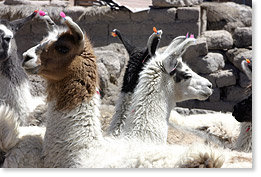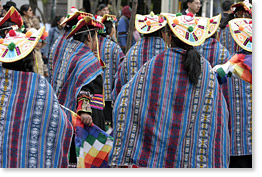|
Interview with Bertha Blanco
of Bartolina Sisa National Federation of Campesina Women of Bolivia IPSP Department / For the Sovereignty of the Peoples Part 2: The History of Our Ancestors Time to Take Responsibility for Political Decisions La Paz, Bolivia
The Assembly is our maximum authority In Motion Magazine: What does Bartolina Sisa think about land reform? Bertha Blanco: According to the beliefs of our indigenous peoples, land is identity. Man cannot live in the air. Man lives in a particular territory with its customs and traditions. Bartolina Sisa and Tupac Katari fought for that. When the Spaniards came the indigenous peoples were left completely without territory, without land, without identity. And what they (Bartolina Sisa and Tupac Katari) wanted to do was recover it, because thousands of men and women cannot live without identity. We have to make that identity be respected, and we have to recover it. That is what we have fought for. They left us their idea quite clearly: that we are a people without identity because at this time we do not have our territory in our hands. That is why we are trying to get there and, by taking on a political arm, we have entered into power, and from power to the Constituent Assembly, in order to forge a new restructuring of lands. A few people cannot have expanses of land, which were distributed when they were part of the political power, when they took hold of the map and marked out the lands where they were owners. There has to be restructuring now and a distribution of lands, but according to needs. There are many compañeros without lands, and this cannot be. There are some who do not work the land, but they are the masters. The land has to be for the one who coexists with it. This Andean people have to recover it. That is why studies are being made so that there can be new reforms here in Bolivia. It has to be. So many brothers should not be going to other countries, even to the United States. How many Bolivians are going to Spain, to Italy, Japan? Why? Because there is no place to live or way to live. That is why there has to be a new reform so that our brothers do not go and they will be able to live well on this land. That is why there must be a new redistribution of lands, which should be approved in the Constituent Assembly. (Editor: The Bolivian senate approved a new land reform bill, and President Evo Morales signed it into law on Tuesday, November 28, 2006.) Gender equity in all political spaces In Motion Magazine: What is the situation for women? Bertha Blanco: As Bartolina Sisa, we have not been able to work on the issue of women, because the enemy was mutual for both (men and women), for the indigenous people. What was important was to free ourselves then, and we couldn’t think about whether women had to free themselves from men or not. Our identity had to be defended. That was our struggle from the first. Inside our struggle, they talk about "chacha warmi" where both men, as well as women, decide. With the influence of the city on society, machismo has been increasing. We have not been involved in the issue of women, but we have looked at the state structures of the previous governments where there were just men. If you go to the government palace, to the parliament and senate, and look at the photographs of all the deputies, they are just men, with none of our indigenous people participating. Now you can look at the Constituent Assembly, there is a woman who is from Bartolina Sisa. There is a place for us. But what we want now is to be in the Constituent Assembly with our proposal for the indigenous peoples, which has been analyzed in all the national organizations, the CONAMAQ (Consejo Nacional de Marcas y Ayllus de Qullasuyu), el CIDOB (Confederación de Pueblos Indígenas de Bolivia), la CSUTSB (Confederación Sindical Única de Trabajadores Campesinos de Bolivia) and the Bartolina Sisa Federation of Women. We have held meetings all this year in order to make the proposal real in the Constituent Assembly. And there we have proposed -- as Bartolinas, as women -- the participation with gender equity in all political spaces, unions, social and public organizations, insisting that women have the same rights as men. When there are only men in a government, it's not right, something is wrong. In addition, men have a different way of thinking, and women have a different way of thinking, and the two are complementary. If not, there would not be couples in the world. So women think differently, and that is why I think there should be gender equity in a government, in all parts of the world, because women have rights just as men do. The rights of the indigenous peoples So, as Bartolina Sisa, we think there has to be gender equity everywhere, and there should also be participation and access to natural resources. It is true that we have experienced moments of exclusion, exclusion between men and women. We were not able to participate in the organizations, because women are always more excluded. But at certain moments in the struggle, you have to look at the Right wing and the indigenous peoples. You have to look at your position. You cannot still be fighting for gender rights. You have to fight for the rights of the indigenous peoples, and that's what we have seen as women. We have fought for the greater rights of the indigenous peoples. Today we are proposing gender equity in the Assembly so we won’t be fighting among men and women. By having equity in the executive branch, in the social arena, in unions, we will be applying and complementing the meaning of Chacha-warmi, that is, achieving participation with gender equity. That is what we have proposed in the Constituent Assembly, and it has also been supported by the men's organizations. President Evo Morales In Motion Magazine: Would you like to talk a bit about the president? Bertha Blanco: About our President of Bolivia. I have known him ever since he was a child. I'm almost like his mama. I knew him in the organizations. Coincidentally, our farm is in the Chapare, and two farms down from ours was where he lived. Once, when I was in Chapare talking to him, he told me: “I live close to your farm.” For me, he was a boy who suffered from social problems, for example: during the period of the failure of the mining industry, the tin, there was a lot of relocation, and all the miners were left without work. They gave them their severance pay, and later they had to adapt wherever they could. Here in the city of El Alto there are many mining areas where they have come to live because there was no longer any work in the mines. Don Evo Morales came to live in the Chapare, because he had nowhere else to go. He made his farm here. It is difficult and hard to live in Chapare, but you can live with dignity if you plant plantains, grow pátano. If you plant yucca, you will be harvesting it in six months. Rice is already producing in three months. The soil produces a lot, you can live and you can grow food in a very short time. For example, there is the "noventón" which means that in ninety days it’s already producing fruit. The land is very good. However, if you live here in the altiplano or in the city, you don’t know whether or not you're going to have work. So people go where they're sure they're going to feed themselves. I think many people have gone to Chapare to live, in order to eat and not to be begging. That is why they have bought their farms and cultivated what there is: coca, plantain, rice, yucca, citrus and everything else that can be grown. We also grew, my mother grew more vegetables. She planted cucumbers, tomatoes, Rocoto peppers, everything that's in the valleys. My mama grew them, and she sold them to the people who grew coca or rice. Later on we also went into growing rice. The coca leaf He (Evo Morales) has a brother and an older sister, Doña Ester, who has been like his mama. His parents had apparently died earlier. They were left orphans, and the eldest sister took charge of them. I knew him in the organization. We have seen him all the time, ever since he was young. He didn't have a wife. The leaders are usually devoted to the organization. They are at the service of the organization. He has lent his services for many years to the Trópico de la Cochabamba organization, to the cocaleros who have suffered from much persecution because of coca ever since the Law 1008. Previously there were not any drugs in Bolivia, and ever since they began being grown, the coca producers have been destroyed, especially in the countryside, those in the east as well as in the west. Everyone chews coca: at work, at night, a chew during work, when you go to work or at work, in the morning, in the afternoon, at noon, they always chew coca. Everybody, everyone who has his field has his little bag of coca. With 1008 they began punishing the coca leaf and the people. Now they cannot produce more or buy more than just a specific quantity, because now it’s against the law. But they made a bad policy. The United States has also had to do with seeing to coca not being produced, thinking about the quantity of drugs that are consumed in their country. But we have never produced the drug. It has been the big drug traffickers who have made that use of it, and they are not being punished for that. For us, coca leaf is for chewing. If you chew it, it does not do you any harm at all. It is something normal in any home, in any part of the countryside, in the east as well as the west. If you go to the countryside, they are always chewing their bit of coca, and this has brought many problems because it's part of our Andean cosmovision. When we have to pay our favor to Pachamama, we always do so with a little coca leaf. It's like in the Catholic Church; they partake of the host, which is a means to meet God. For us as well, it is in order to meet with our Pachamama, as an expression of gratitude. That is why we say the coca leaf is sacred. Compañero Evo has always been faithful But they have made it a drug, and they have done us a lot of harm with that. The persecutions began, and I think that is why compañero Evo organized everyone who grows it and why they have organized in defense of coca. He gained power and became president by defending coca because he is a man who does not give in. He knows that it's not right to penalize coca leaf, and he has been persevering in his convictions which he has struggled for, and he has never given in. He has always been faithful to the organizations, and that is why he is so appreciated. He has never betrayed us, and I think he is not going to betray us when he is in government either. Pachamama Solidarity Association of Artisans In Motion Magazine: Lastly, would you like to talk a bit about the artisan organization? Bertha Blanco: I have been in Bartolina Sisa for two years, and since I’ve lived here I have begun making friendships and collaborating in one of the parishes in El Alto. They have given me the opportunity to organize groups of women here. Here I have seen the problem of poverty, the lack of sources of employment, the problem of not being able to secure financial means in the city in order to be able to support a family. So the man goes to work, and he may find work or he might not, but when you have a family, you can't say there isn't any money, you have to cook every day. So that is why we have begun organizing groups of women. We have given them the name of Pachamama Association. Pachamama, because it is she who gives us things to eat in the city. Then we formalized the organization as the Pachamama Solidarity Association of Artisans. We began with alpaca and sheep woolen fabrics, teaching and producing sweaters, tights, caps and gloves. At one point we had 300 persons. Depending on the orders there could be 70, 80, 100 of us. When there are no orders, there are 35, 50 of us women. We meet every Tuesday. I'm not going a lot now because of a lack of time, but everyone meets on Tuesdays, like an assembly. Here we see if there are any orders, we make new designs and we train ourselves. What’s lovely is that it is a permanent meeting so that we don't lose touch with each other, so we can still be individuals together. We have begun making alpaca knit goods, we've spun and we have knit. We've gone out and sold them here in the artisan areas. We give credit, and later they pay us. We pay the labor with that, putting one part into the capital fund in order to buy wool. And so we have a capital fund for wool and a capital fund for labor. Once we sell it, we leave the capital and we pay for the labor. We don't have a big market, and we had opened a shop here in the artisan area, but we've closed it now since there have been so many factory closings, and that has created a lot of unemployment. Many people have been working in crafts, and the prices have gone down. It's no longer possible to pay the rent on a business because the area has also become very expensive and we can't cover the costs of a business -- we were paying $250 for a shop. And so we've stopped selling. But we have had contacts with fair trade in Italy, who are the ones who are now giving us work. As a group which has a market What is our goal? To not have intermediaries. Instead of the intermediary making money, we would prefer the compañeras to be making it. On the other hand, we also don't charge a lot so there will be more sales and that way we’ll have more orders. That's what we're doing now. This year we had a lot of orders from Italy, but we haven't put more on offer, because we're afraid of not being able to deliver. When they give us an order, we have to fulfill it, so this year we had a good order, and the people have been happy because there weren’t any intermediaries. On the other hand, they have given us courses in designs, models, colors, and that has also opened our minds a bit. We were a little close-minded regarding new sketches, designs, sizes which aren’t the same as sizes in other countries. For that reason we have received training courses which have helped us quite a lot. Now what we are seeing is the possibility that as a group we can have a market. We want to open more spaces in our organization in order to help others in other departments in Bartolina (editor: Bolivia is divided into departaments). Although we often don't have much space -- that is, there is union and organizational work -- we see we haven't grown at the productive level of the rest of Bartolina Sisa. We are seeing the possibility of tying everything together -- the productive, the artisanal -- channeling it in that way with fair trade directly. Although it is still just an idea. Our testimony from Bartolina In Motion Magazine: Thank you very much. Bertha Blanco: You are welcome. Hopefully our experience might be useful for other countries who are perhaps more developed than we are. But from a human and social perspective, I think we have a lot of organizational ability in Bolivia, more than in other countries. We're very tied to the organization. We even organize to sell stones. We don't stay still, whatever it is, the leaders always come quickly and organize wherever we are. Our task is organizing. It's good to be organized, because that's the only way we will be able to do politics. We never used to get involved in politics, just in the organization. But when we see so many things, we have said: "It's time to take responsibility for political decisions as well." It's important, yes. Our very best wishes to all our brothers who are going to listen to our testimony from Bartolina. Published in In Motion Magazine March 6, 2007 Also see:
|
||||||||||||||||||||||||
If you have any thoughts on this or would like to contribute to an ongoing discussion in the  What is New? || Affirmative Action || Art Changes || Autonomy: Chiapas - California || Community Images || Education Rights || E-mail, Opinions and Discussion || En español || Essays from Ireland || Global Eyes || Healthcare || Human Rights/Civil Rights || Piri Thomas || Photo of the Week || QA: Interviews || Region || Rural America || Search || Donate || To be notified of new articles || Survey || In Motion Magazine's Store || In Motion Magazine Staff || In Unity Book of Photos || Links Around The World NPC Productions Copyright © 1995-2018 NPC Productions as a compilation. All Rights Reserved. |


